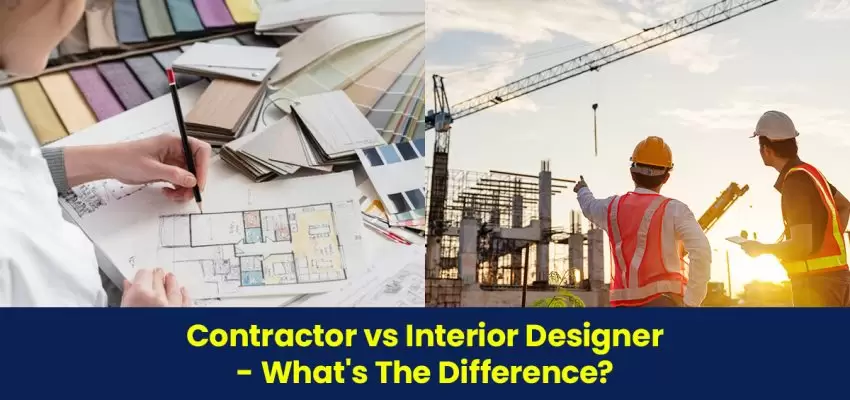Choosing between a contractor and an interior designer for home improvement involves understanding their roles. Contractors manage the physical aspects of construction, executing plans, and handling subcontractors. On the other hand, interior designers focus on aesthetics, creating a cohesive look and feel for spaces. Deciding which suits you depends on your priorities – a contractor for practical execution or an interior designer for artistic guidance. Balancing both perspectives may lead to a harmonious home transformation that aligns with your vision.
Post your Requirement
What should you opt for?
You can differentiate between contractors and interior designers based on the services they offer.
1. Contractor VS Interior Designers – What Do They Do?
Contractors focus on the execution of the project – based on the instructions provided by the homeowners. The homeowners have to be specific about their expectations and tell the contractor exactly what they are looking for.
Interior designers are design experts – they visit your space, listen to your requirements, visualize the changes needed, and based on their observations, give you an idea as to how your space would look after the project. Once you give them the go-ahead, they will take care of the sourcing of materials, hiring the contractor, subcontractors, etc. Every interior designer tends to have a particular ‘style’ or ‘flair’. Here too, the homeowner must convey his/her expectations and requirements to get the best results.
2. Contractor VS Interior Designers – Budget and Pricing?
Engaging a contractor often appears cost-effective initially, as their focus is solely on executing the homeowner’s instructions. However, this approach can be a double-edged sword. While the upfront costs may seem lower, the absence of design expertise can lead to unsound choices. The resultant need for rework and rectifications can quickly escalate expenses, potentially surpassing the initial budget. Homeowners may find themselves grappling with unforeseen costs and compromises in the outcome.
Conversely, an interior designer provides a comprehensive quotation that encompasses all aspects of the project. This includes not only the discussed designs but also the costs of materials, contractor and subcontractor fees, and other relevant expenses. The budget, collaboratively established between the homeowner and the designer, serves as a roadmap for the project. With a detailed plan in place, changes are less likely, minimizing the chances of rework and rectifications.
While the initial investment in an interior designer may seem higher, the all-encompassing nature of their quotation promotes transparency and reduces the risk of budget overruns. The expertise of an interior designer can lead to a more efficient and aesthetically pleasing project, potentially saving homeowners from the hidden costs associated with rectifying issues that may arise in the absence of professional design guidance.
3. Contractor VS Interior Designers – Time Taken For Completion?
When opting for a contractor, the homeowner assumes a commanding role, steering the project with personalized timelines. It grants a sense of control as decisions about each phase are at the homeowner’s discretion. This approach suits those seeking efficient execution aligned with their vision, making it ideal for those who have a clear plan in mind.
On the contrary, engaging an interior designer introduces a more collaborative yet time-intensive process. The intricate stages involve consultations, design deliberations, quotation development, and finalization, with the designer orchestrating the schedule. While this might extend the overall timeline, it ensures a meticulous approach to the project’s creative and functional aspects. The homeowner experiences a shift from sole decision-maker to a participant in a collaborative venture, benefiting from the designer’s expertise.
Choosing between the two approaches depends on individual preferences and priorities. A homeowner seeking swift implementation may favor a contractor-led approach, while those valuing a nuanced, professionally guided design process may find the slightly elongated timeline with an interior designer worthwhile for a more refined and thoughtfully curated end result.
4. Contractor VS Interior Designers – What To Look For?
Contractors are task-oriented, adhering strictly to instructions without offering design insights. They excel at executing plans but may lack a creative touch. In contrast, interior designers bring professionalism, providing regular project updates and actively proposing enhancements. Their expertise extends beyond execution, with a keen eye for aesthetics and functionality. Interior designers offer ongoing support, following up post-project completion to address any issues. While contractors focus on the immediate job, interior designers invest in a collaborative and comprehensive approach, ensuring the end result not only meets specifications but also exceeds expectations through thoughtful design and continuous client engagement.
5. Contractor VS Interior Designers – Whom Do You Hire?
Hire a contractor for service-based tasks – electrical wiring, carpentry, piping, false ceilings, etc. which are execution-focused and can be done without excessive emphasis on design. Hiring one is suitable for someone who has the experience and the time to instruct the contractor.
Conclusion
Hiring an interior designer works best for those who don’t have the time to micro-manage the interior design project by themselves – once the project is handed over to the designer, the designer effectively takes care of everything, from the design to the final execution.
You may also choose to hire an interior designer AND a contractor – to consult the designer for the design and rely on your contractors, subcontractors, and the like, for executing as per the plan.























Post A Comment